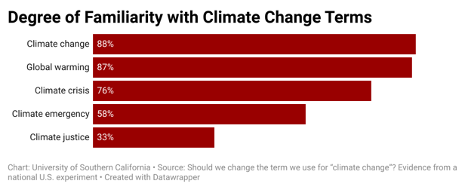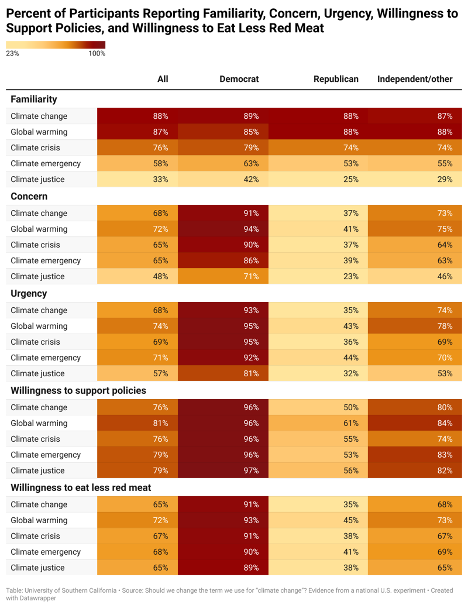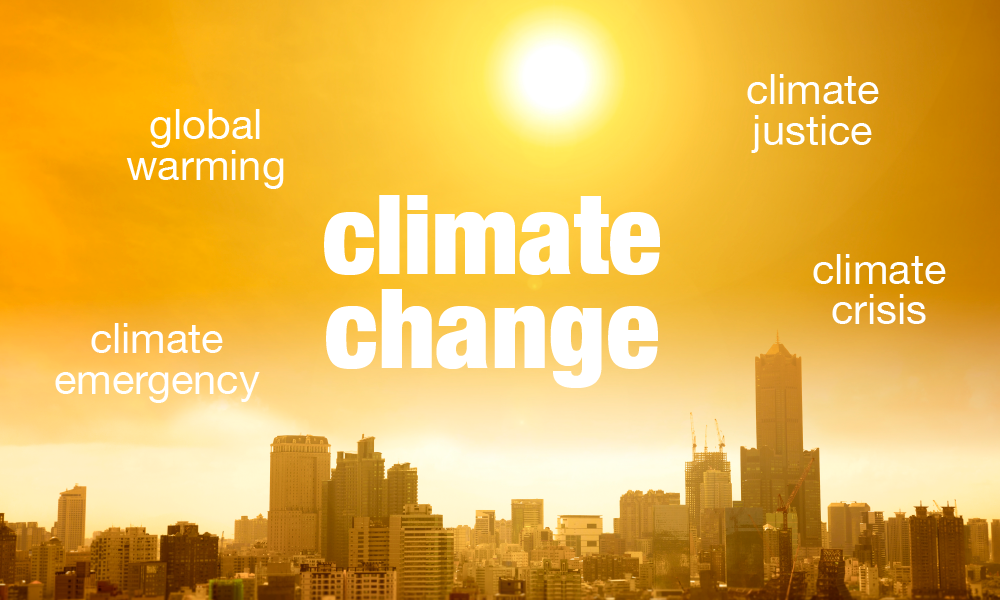In 2019, The Guardian newspaper announced that it would start using the terms “climate emergency, crisis or breakdown” in place of “climate change.”
“The phrase ‘climate change’, for example, sounds rather passive and gentle when what scientists are talking about is a catastrophe for humanity,” said the editor-in-chief, Katharine Viner.
But as it turns out, the gentler approach is more effective.
According to a USC study published today in the journal Climatic Change, people are not only more familiar with “climate change” and “global warming,” the terms generate more concern than their over-heated alternatives: “climate crisis,” “climate emergency,” and “climate justice.”

Master of Public Policy
Advocate & Innovate for a More Just World
Effective public policy has the power to disentangle increasingly complex global and domestic challenges. With an MPP from USC, you will have that power too.
Find Out More“Terms that are familiar are more likely to resonate with people. It’s harder to feel concern about something you’re not sure you’ve heard of,” said Professor Wändi Bruine de Bruin, the study’s lead author and director of the Behavioral Science & Policy Initiative at the USC Schaeffer Institute for Public Policy & Government Service. Bruine de Bruin is also Provost Professor of Public Policy, Psychology, and Behavioral Science at the USC Price School of Public Policy and USC Dornsife College of Letters, Arts and Sciences.
The study began by looking at how familiar people are with the terms “global warming,” “climate change,” “climate crisis,” “climate emergency,” and “climate justice.” Close to 90% of respondents were familiar with “climate change” and “global warming.” But familiarity dropped off sharply for the other terms, with only 33% of the respondents recognizing “climate justice.”

The study also looked at the degree to which each term generated concern, urgency, willingness to support climate-friendly policies and willingness to eat less red meat. (The production of red meat is a major contributor to climate change and other environmental impacts, so eating less of it can lower one’s environmental footprint.) Finally, the study examined how perceptions differed based on political affiliation.
Overall, according to the study, “climate change” and “global warming” were rated as most familiar, most concerning, and most urgent, and “climate justice” the least, with ratings for “climate crisis” and “climate emergency” falling in between. The overall support for climate policy and willingness to eat less red meat was roughly the same, independent of the terms that were used (see Table 3).
Results were strikingly different by political party affiliation. For example:
- 91% of Democrats and 74% of Independents expressed concern about “climate change.” Only 37% of Republicans expressed concern.
- Seventy-one percent of Democrats were concerned about “climate justice,” versus 46% of Independents and 23% of Republicans. The paper noted that familiarity and concern for “climate justice” may be lower because fewer people recognize the term and/or because it is more politically polarizing.
- When the term “global warming” was associated with willingness to support policies, 96% of Democrats were on board, compared to 85% of Independents and 61% of Republicans.
- A majority of respondents overall said they were willing to eat less red meat regardless of which term the action was associated with. But broken down by party affiliation, less than half of Republicans said they’d eat less meat, whereas 89% or more of Democrats supported the action. Independents fell somewhere in between.
The study is the latest in a series of investigations led by Bruine de Bruin into perceptions about various aspects of climate change communication. Her recent work included an examination of how well people understand words and terms commonly used by the Intergovernmental Panel on Climate Change (IPCC). This study was followed by one that examined how well IPCC graphics are understood by policymakers with tips for improving them. Both of these studies were done under the auspices of the USC Dornsife Public Exchange and in partnership with the United Nations Foundation.
“The goal of our research is to inform how to better communicate about climate change,” said Gale Sinatra, co-author of the most recent study. “You can have the best climate science in the world, but it won’t do much good if you don’t know how to talk about it in a way that makes sense to people.”
Sinatra is Stephen H. Crocker Chair, Professor of Education and Psychology and Associate Dean for Research at the USC Rossier School of Education.
The climate terms study included 5,137 U.S. residents randomly selected from the Understanding America Study at USC Dornsife’s Center for Economic and Social Research. Additional co-authors included Laurel Kruke, a Ph.D. student at USC Rossier; and Norbert Schwarz, Provost Professor of Psychology and Marketing at USC Dornsife and the USC Marshall School of Business.
The study was funded in part by the USC Dornsife Wrigley Institute for Environment and Sustainability. Bruine de Bruin received additional support from the Golden Belt Community Foundation.






